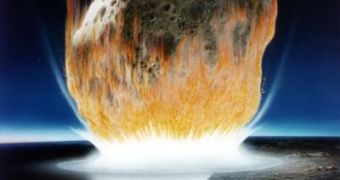Scientists speaking at the Goldschmidt conference in Florence this August 27 stated that, according to their investigations, the meteorite that hit Russia earlier this year, on February 15, underwent an intensive melting process some time before entering our planet's atmosphere and disintegrating.
Scientists who have had the chance to examine bits and pieces left behind by the space rock explain that, after analyzing several meteorite fragments, they found that their structure and texture showed signs of melting.
“Of the many fragments we've been analyzing, only three dark samples show strong evidence of earlier metamorphism and melting,” Dr. Victor Sharygin at the Institute of Geology and Mineralogy explains.
Given the fact that this melting occurred while the meteorite was still in space, researchers suspect that it happened because the space rock collided with another body that was also floating about our solar system.
One other possibility is that the meteorite came a tad too close to the Sun and partly melted as a result of its being exposed to extremely high temperatures recorded in the star's proximity.
“The meteorite which landed near Chelyabinsk is a type known as an LL5 chondrite and it's fairly common for these to have undergone a melting process before they fall to Earth,” Dr. Victor Sharygin adds, as cited by Science News.
“This almost certainly means that there was a collision between the Chelyabinsk meteorite and another body in the solar system or a near miss with the Sun,” he further details.
For the time being, scientists lack sufficient evidence to determine how much of the meteorite got destroyed when the space rock traveled close to the Sun or collided with another space body.
As Dr. Victor Sharygin puts it, “Many fragments of the meteorite were picked up by members of the public, so it's impossible to say how large a portion of the meteorite was affected.”
Scientists hope to have more information once they retrieve and analyze the meteorite's main body from Russia's Chebarkul Lake.

 14 DAY TRIAL //
14 DAY TRIAL //